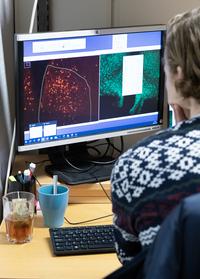
PhD student Sebastian is doing research on weight regulation and metabolism.
Sebastian’s interest in research started in early childhood. His family often discussed the concept of ‘truth’ when gathering round at dinner. During college he was quite busy doing physical exercise, which made him start reflecting about exercise and health and it led to an increased interest in research: How do you maintain health? How do the brain and body work? How can different pharmaceutical drugs be used and what drugs will we have in the future?
Can you give us a summary of your dissertation project?
"Our group’s research involves investigating how the drug semaglutide (e.g. Ozempic™, Wegovy™) acts in the brain to induce weight loss. My project specifically aims to find out how the drug works in the hypothalamus – the part of the brain responsible for most of the regulation of metabolism."
What questions do you want to find the answers to?
"The questions we address are for example: What cell types are affected by semaglutide and what effects can be derived from them? How is semaglutide taken up by the brain and what happens if we block that process – what effects will disappear?"
What would you say have been the best aspects of conducting your project so far?
"In general, it has been incredibly fun to learn new things, both theoretically and practically. I like learning, so to have the opportunity to do that within a subject and field where I’ve had a longstanding interest, has been a pleasure."
"Speaking with my supervisor, Linda, has also been fun and inspiring. For example, speculating on how the hypothalamus and the neural circuits we are investigating work, and discussing different types of exciting experiments that we could do (if time and money were plenty) has been a lot of fun. Being able to ask and discuss whatever questions pops up with someone who knows a lot on the subject, is a great resource and pleasure."
Can you describe a typical day for you as a doctoral student?
"A fantastic thing about being a PhD student is that there isn’t really a “typical day”; the days can vary greatly, and there is a lot of room to decide for yourself how you want to organize your work. That said, the days consist of some computer work, some laboratory work, and some work in the Experimental Biomedicine building, EBM, where we conduct our animal experiments."
"Some of the things we do in the lab in the Physiology building include, for example, checking gene expression in mice and performing various forms of immunohistochemical analysis on tissue from different experiments, such as detecting and quantifying proteins and signaling substances."
"In the EBM building, we have our mice and other labs for surgery and animal experiments. Very briefly, most experiments mainly consist of administering semaglutide to mice and then weighing them and their food intake."
What do you hope the results will lead to?
"Considering the dramatic increase in obesity worldwide and how detrimental obesity is to health, research into possible solutions is very important. Semaglutide is presently one of the most effective drugs when it comes to weight loss, but it also has some side effects, such as nausea and diarrhea."
"Many future drugs build on this type of medication, and in the hope of creating even better drugs based on those that already exist, it is beneficial to know their mechanisms of action. For example, if one could derive where the side effects come from and where the beneficial effects come from, it opens up possibilities for creating better drugs."
"Semaglutide has also become incredibly popular due to its effectiveness, and more and more patients are using it specifically for weight control. Therefore, it is especially important to know what semaglutide does in the brain now that so many people are using it."

Have you encountered any challenges?
"Absolutely, I have encountered quite a few challenges during my first years. The second part of the dissertation project has been quite difficult to clarify. To make a long story short, I spent several months performing surgeries on mice and conducting long-term food intake studies as well as various analyses of the brains – without any particularly encouraging results."
"It was tough to work for so long with “negative” results, but in the end, I feel that we have come closer to the truth. It’s a bit in my nature to ponder and speculate, so it doesn’t feel like we’re empty-handed after some “setbacks” – it still feels like we’ve come closer to understanding how the drug actually works."
Is there anything you particularly think one should consider before starting doctoral studies?
"I think one should reflect a bit on how interested they are in the core problem and subject. If you have a genuine interest and feel that you want to and can do something meaningful with that interest, then you should go for it. Surprising moments, results, and setbacks of various kinds are something most people encounter during their doctoral studies – then it’s good to have a long-term sense of purpose behind what you do."
_____________________________
*E.g. Ozempic™, Wegovy™

About Sebastian Blid Sköldheden
Education:
Pharmaceutical Program, University of Gothenburg
Current employment:
Doctoral student at the Department of Physiology.
Interests (other than research): Books, exercising, MMA: Brazilian jiu jitsu, submission wrestling, kick-boxing), playing the guitar, music, wiring and reading.



